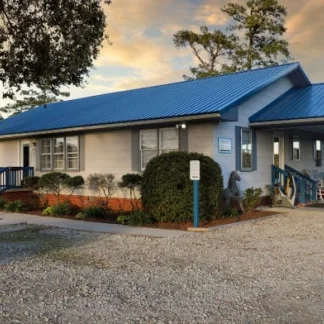Brunswick Christian Recovery Center
Ash, North Carolina, 1994 Ash Little River Road NW, 28420
Available Programs
- Adult program
- Program for men
- Total beds : 20
- Young adult program
Insurance and Financial
- 90 day cost : $10,000
- Free
- Self-pay options
About this Facility
The Brunswick Christian Recovery Center is a 16 week residential, faith based men’s addiction recovery program. Located in Ash, NC, the center’s holistic approach incorporates the 12 step process, faith based recovery theory, and educational benefits through Brunswick Community College.
Brunswick Christian Recovery Center offers a 16 week faith based recovery program for men. The residential program, located in Ash, NC, is free for participants who are accepted to the program through an application process. The program combines faith based recovery, 12 step methods, and educational components through Brunswick Community College.
The 16 week program serves men who are suffering from addiction to alcohol or drugs. During their stay, men are encouraged to pursue faith, work the 12 steps as outlined by Alcoholics Anonymous, and pursue work based learning opportunities to facilitate financial independence. Residents pray, worship, and study together, devoting significant time to applying Biblical principles and the 12 steps. The Center emphasizes the need for confession of shortcomings, taking moral inventory, making restitution, and serving God and others.
Participants at the Brunswick Christian Recovery Center work through a Motivational Track and four Phases of treatment during their 16 week stay. The Motivational Track is the initial phase during which residents acclimate to the Center’s environment and adjust to a new strictly regulated schedule. The schedule becomes more rigorous when they enter Phase 1.
As residents work through the four Phases, they participate in pastoral counseling, individual and group therapy, vocational training, and exit planning. Staff and senior residents review each resident after their completion of each phase to determine if they are ready for the next phase. This review includes compliance with Center rules, emotional and spiritual growth, active recovery, and personal responsibility.
Brunswick Christian Recovery Center offers the 16 week treatment program free of charge. Participants must apply to the program. Acceptance requires an interview with the Director of Admissions.
Contact us for more information: (910) 287-4357

Contact Brunswick Christian Recovery Center
Connect with Brunswick Christian Recovery Center by calling their admissions team directly.
(910) 287-4357 Website Get Directions